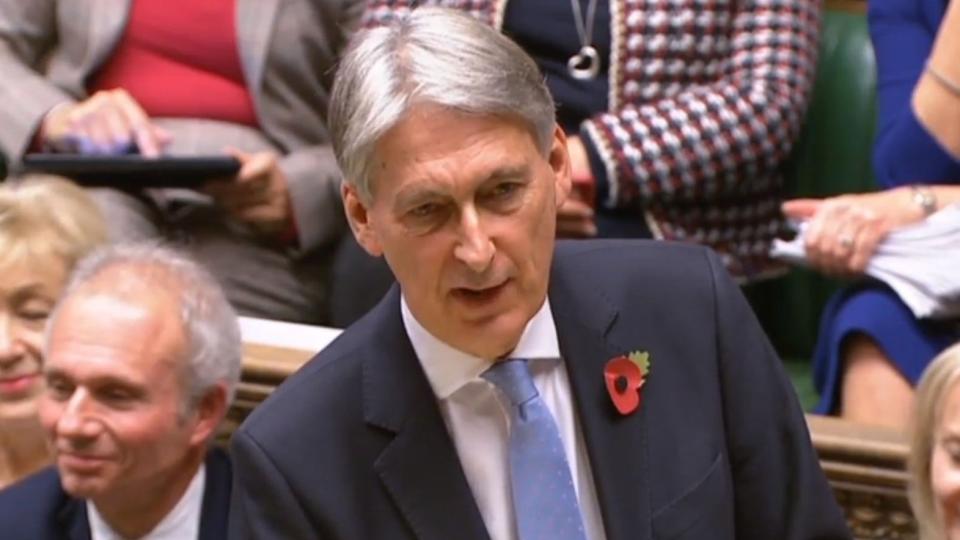UK chancellor touts Brexit 'double deal dividend' as he delivers final budget before EU exit

UK chancellor Philip Hammond touted the possibility of a “double deal dividend” on Brexit during his final budget before Britain leaves the EU.
Hammond said on Monday that Britain could benefit from both a positive Brexit deal with the EU and the unlocking of funding the finance minister has set aside in case of adverse Brexit effects.
The economy could benefit from “a boost from the end of uncertainty and a boost from releasing some of the fiscal headroom that I am holding in reserve, at the moment” Hammond said.
“We are confident that we will secure a deal that delivers that dividend,” he said. “Confident, but not complacent.”
He promised a three-pronged approach to Brexit planning, with extra Brexit funding for government departments, a continuation of relaxed government spending rules just in case, and a promise to do “whatever it takes” fiscally in the future.
Hammond, who has been finance minister since 2016, drew a rebuke from the Prime Minister’s Office earlier on Monday after he said on Sunday that spending plans announced in the budget would depend on the eventual Brexit deal. The prime minister’s spokesperson said on Monday that spending commitments are “funded irrespective of a deal.”
The UK is due to leave the EU in March 2019 but it has yet to agree a deal on its future trading relationship with the bloc.
‘The era of austerity is coming to an end’
Britain’s finance minister delivered the final budget before Brexit in the House of Commons, saying: “The era of austerity is finally coming to an end.”
He said that the “perseverance of the British people finally paying off” during his annual budget address on Monday. Hammond introduced his budget by saying it was “for Britain’s future” and “hard working families.”
An end to austerity had been widely trailed ahead of the speech, with prime minister Theresa May saying at the Conservative party conference earlier this month that the years of “sacrifice” were coming to an end.
The Conservative party spearheaded a policy of austerity — cutting government spending to reduce the deficit — after coming into office in coalition in 2010. The public spending deficit has since reduced from 8.8% of GDP to 2%, according to the Office for National Statistics.
Hammond said: “The tough decisions of the past eight years were not driven by ideology, they were driven by necessity and by the failure of the party opposite in government which led to our economy soaring to a post-war record.”
NHS gets £20.5bn
As part of the end to austerity, Hammond announced an extra £20.5bn in funding for the NHS over the next five years, with a particular emphasis on mental health facilities.
He also announced:
an additional £1bn in funding for the Ministry of Defence
an extra £160 million for counter terrorism police
£650m more for English councils 2019-2020
£420m for fixing potholes and upgrading roads
an increase in the National Productivity Investment Fund from £31bn to £38bn by 2023-24
a £400m “in-year bonus” for schools to buy supplies
£675m for a Future High Street Fund in partnership with councils
a business rates cut by a third for independent shops, pubs, and cafes
an additional £500m for the Housing Infrastructure Fund to build 650,000 homes
In total, the government announced an additional £30bn-worth of spending up to 2024.
Hammond also announced mild upgrades to growth forecasts for 2019 and 2020 from the Office for Budget Responsibility. Here are the latest OBR stats:
2019: 1.6%, up from 1.3% in the Spring statement
2020: 1.4%, up from 1.3% in the Spring statement
2021: 1.4%, matching 1.4% in the Spring statement
2022: 1.5%, matching 1.5% in the Spring statement
2023: 1.6% (new forecast)
Facebook and Google in tax target
As well as new spending, Hammond also announced a new “digital services tax” that will target tech giants.
The new tax, which comes into force in 2020, will target tech companies with revenues of over £500m on relevant business lines and those which are profitable in the UK.
The new tax is expected to raise an additional £400m, Hammond said.
The proposals appear designed to target Us tech firms such as Google and Facebook, which have been criticised for their tax arrangements in the UK.
Hammond in fact made an oblique reference to Facebook in his speech, saying he is “already looking forward to his call from the former leader of the Liberal Democrats.” Facebook recently hired Nick Clegg, the former leader of the LibDems, as its head of global affairs and communications.
On tax, the chancellor also announced a new levy on the manufacture and import of plastic packaging.

 Yahoo Finance
Yahoo Finance 